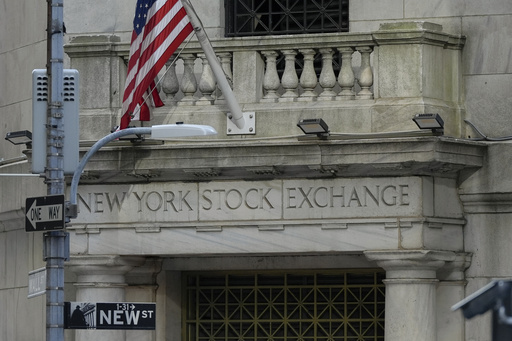NEW YORK — U.S. stock markets experienced significant declines on Friday, influenced by reports indicating that consumer and business concerns regarding President Donald Trump’s policies might be adversely affecting the economy.
The S&P 500 index fell by 1.7%, marking its most challenging day in two months. The Dow Jones Industrial Average lost 748 points, a drop of 1.7%, while the Nasdaq composite dropped even more steeply at 2.2%.
The mounting losses were exacerbated throughout the day following the release of several disappointing economic reports. One key report revealed that business activity in the U.S. is nearing a standstill, with growth slowing to its lowest rate in 17 months. According to preliminary data from S&P Global, there was an unexpected contraction in activity among U.S. service industries, with many respondents noting a decrease in optimism attributed to factors related to Washington.
Chris Williamson, the chief business economist at S&P Global Market Intelligence, highlighted widespread fears among companies regarding the effects of federal government policies, which range from spending cuts to tariffs alongside various geopolitical issues. He noted that uncertainty stemming from the fluctuating political landscape is reportedly impacting sales, and companies are facing rising costs due to supplier price hikes linked to tariffs.
Additionally, another report indicated that American consumers are bracing for higher inflation, partly due to anticipated tariffs that could drive up prices for various imports. Survey data from the University of Michigan showed that consumers expect prices to rise by 4.3% over the next year, an increase from their previous prediction of 3.3%. Among U.S. households, a notable disparity in inflation expectations was observed, with independents and Democrats forecasting higher inflation, while Republicans showed a slight decrease.
A third economic update indicated that sales of previously owned homes fell short of economists’ predictions, with high mortgage rates and costly housing prices contributing to the decline.
Despite these setbacks, the U.S. stock market has generally been on an upward trend this year and remains close to its all-time highs reached earlier this week. Analysts on Wall Street are largely not anticipating a recession in the near term. However, the reports raised concerns about the overall robustness of the U.S. economy, and Friday’s trading session saw extensive losses across the board.
Small-cap stocks, specifically, which typically have profits that more directly relate to the U.S. economy’s health, dropped significantly, with the Russell 2000 index leading the decline at 2.9%.
In the S&P 500, approximately 75% of stocks declined. Shares fell across various sectors, from technology stocks benefitting from the artificial intelligence boom to airlines and metal producers. Notable declines included Nvidia, which dropped 4.1%, United Airlines losing 6.4%, and Newmont Mining falling by 5.7%.
Akamai Technologies experienced the most significant decline within the S&P 500, plummeting 21.7% despite reporting stronger-than-expected quarterly profits. Investor focus shifted to its disappointing forecasts for upcoming revenue and financial measures.
On a more positive note, Celsius Holdings, which offers health-focused energy drinks, surged by 27.8% following its announcement to acquire Alani Nu, a beverage firm targeting female consumers. Analysts deemed the acquisition price of $1.65 billion, after tax considerations, to be reasonable and believed it would contribute positively to Celsius’ profits.
Other stocks that performed well included those from companies typically less affected by economic fluctuations, such as American Water Works, which saw an increase of 3.1%.
In summary, the S&P 500 decreased by 104.39 points to reach 6,013.13, while the Dow Jones Industrial Average fell by 748.63 to close at 43,428.02, and the Nasdaq composite diminished by 438.36 points to finish at 19,524.01.
Prior to Friday’s significant losses, the S&P 500 had moved very little throughout the week, supported by a series of positive earnings reports that helped mitigate concerns regarding persistent inflation, which might inhibit the Federal Reserve from lowering interest rates to stimulate the economy further.
The Fed has maintained its key interest rate at a steady level after significantly reducing it towards the end of the previous year. Following their most recent policy meeting in January, officials suggested that they may opt to keep rates unchanged due to concerns about how proposed tariffs and mass deportations might contribute to higher inflation.
While lower rates can stimulate economic growth, they might also lead to increased spending that places upward pressure on inflation.
In the bond market, Treasury yields declined following the release of Friday’s weaker economic data, with the yield on the 10-year Treasury falling from 4.51% to 4.42%.
Internationally, stock markets had mixed reactions in Europe after experiencing gains throughout much of Asia.
In Hong Kong, the Hang Seng index surged by 4%, largely driven by robust performance from e-commerce giant Alibaba, which reported better-than-expected profits for the end of the previous year and discussed advancements in its artificial intelligence ventures.
